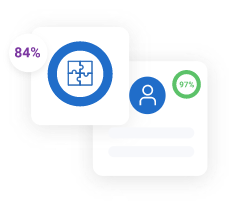- Application
- Information
Apply through Brive
We are official partners! Complete your application for free and earn benefits!
Free review on your application |
1:1 counselling by certified consultants |
Higher acceptance rate on your top choices |
Duration
1 Year
Language
English
90% of students are employed within 6 months
Affordable tuition fees with flexible payment options.
Schedule a free callProgram Description
During the bachelor in Bioinformatics, you will learn about a new and spectacular field that uses methods from informatics to store and process molecular biological information (DNA, proteins, functions). In bioinformatics, molecular biology is combined with informatics and programming. A bioinformatics scientist is capable of retrieving the necessary information from databases and using these to make predictions. As a bioinformatician, you will look for application possibilities of informatics within the (biological/biomedical) laboratory.
In the bachelor in Bioinformatics of the bioinformatics training program, 3 roles are covered: the role of programmer, the role of informatics scientist, and the role of bioinformatics scientist. You learn several programming languages like PHP, Python, and R and you use the most relevant databases of which you learn to process and interpret the data.
During the bachelor in Bioinformatics, there is a special emphasis on the application of open source tools, both in a Windows and in a Linux environment. During the traineeship (without a bachelor’s thesis) a fourth role is addressed, the role of the New Young Professional, in which the more generic competencies of a bachelor (such as working in a team, and clear communication) are pursued.
In the bachelor in Bioinformatics of the bioinformatics training program, 3 roles are covered: the role of programmer, the role of informatics scientist, and the role of bioinformatics scientist. You learn several programming languages like PHP, Python, and R and you use the most relevant databases of which you learn to process and interpret the data.
During the bachelor in Bioinformatics, there is a special emphasis on the application of open source tools, both in a Windows and in a Linux environment. During the traineeship (without a bachelor’s thesis) a fourth role is addressed, the role of the New Young Professional, in which the more generic competencies of a bachelor (such as working in a team, and clear communication) are pursued.
Entry Requirements

Are you eligible to apply?
Sign up, check the entry requirements, and find out your compatibility with the program.
Work Opportunities after Graduation
A lot of students get a job offer while doing the internship. Within 6 months 90% of students are employed.
More
Curriculum
Jobs - Careers
- Informatics Scientist
- Bioinformatics Scientist
- Programmer
More
Outdated Content
The content has not been updated in the last 6 months
Need help applying to this program?
Schedule a free 20-minute counseling session today!